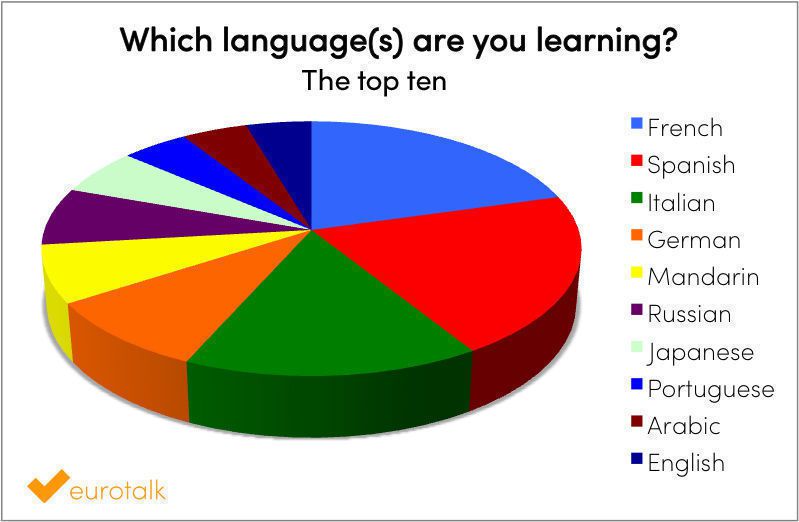Going back to my roots to learn Polish
Alex Koszykowska is the newest member of the EuroTalk team, joining us last month as our new sales and marketing assistant. In today’s post she explains why she’s learning Polish.
It is said that a million people in the UK class Poland as their ancestral home in some way. This is the case for my family; my Granddad came to England from Poland during the second world war (my Gran also came over to England but from Russia – she and my Granddad met when she was a nurse in the army). Over the years my Gran has adapted to my Granddad’s ways, and will now only speak Polish or very basic English to us. Growing up, my dad and his brothers were all brought up speaking Polish as their main language, with English as their second. Even today they can slip into Polish very naturally – leaving my sister and I completely oblivious to what was going on around us. My mum and aunties all learnt to speak Polish – mainly to get brownie points from my Gran; but really it is only my sister, my cousins and I who cannot speak Polish in our family.
This means regularly at our family’s favourite restaurant (which of course is owned by a Polish family), we would be pretending to understand what everyone was talking about.Whenever we entered the hotel, I would always greet the family with ‘Cześć’ (hi). My sister and I have also mastered how to say ‘Dziekuje ci bardzo’, which means ‘thank you very much’ (and rolls off the tongue much more easily then you think it would). We have managed to get away with this throughout our childhood. However, now I feel a certain responsibility to carry on this tradition in our family. Working for EuroTalk has shown me that language learning isn’t as intimidating as many people make out.
 Part of the reason it is so enjoyable to be learning Polish is that I love everything about my Polish roots. From the tradition of whenever we go to my Gran’s she hands us a pack of Katarzynki (which are like soft biscuits with a ginger flavour in the middle and chocolate around the outside) to our rather impossible to say, spell and write surname (with a lot of people finding the change from ‘a’ if you’re female to ‘i’ if you’re male for the last letter of our surname confusing!).
Part of the reason it is so enjoyable to be learning Polish is that I love everything about my Polish roots. From the tradition of whenever we go to my Gran’s she hands us a pack of Katarzynki (which are like soft biscuits with a ginger flavour in the middle and chocolate around the outside) to our rather impossible to say, spell and write surname (with a lot of people finding the change from ‘a’ if you’re female to ‘i’ if you’re male for the last letter of our surname confusing!).
The four words I do know (five if you include dobrze – ok) make my Gran so happy; she loves seeing us take an interest in our Granddad’s language. Even basic language skills are so important and can make a huge difference. My family heritage is my motivation to learn more Polish, which is why the uTalk app is so fabulous, as it is designed so you can learn how to say key phrases. For example ‘proszę mówić wolniej’, meaning ‘please speak more slowly’, which is vital to know in my family!
Are you interested in learning a language, or do you have family members who are bilingual and you’re keen to join them? Try our uTalk app to get started!
Alex
The ups and downs of coming home
When you work abroad as an English as a foreign language teacher, coming home for the occasional visit and obligatory Christmas festivities means there are a number of things to look forward to. Personally custard, gravy and drinkable tap water are pretty high up on my list, but that’s just me. Friends, family, Wetherspoons breakfast… there are all sorts of things that beckon you and make home, home.
But there are also pitfalls, things you forget about and either take for granted or that have become so instilled, you don’t realise you are doing them.
Here’s a few of mine. Play snap?
Roads
No matter how many times I come back, I always get flummoxed by the roads. Left hand lane, right hand lane… I look both ways to prevent becoming a bug stain on a car bonnet every single time. And once I tried to get on the driver’s side of a National Express coach. The driver patted his knee and asked me if I’d like to drive. Possibly not…
Language
Yes, I should know better. But when I want to know the price of something I always find myself speaking in the language of the country from where I have just come – currently ¿Cuánto es? to check a price and perdona when I bump into someone. Which I do. A lot. Clumsy…
Customs
My first cafe visit on arriving back to England involved me trying to kiss a stranger. Not because I’m a floozy, but because I’ve just come from Spain, and the double kiss thing is part of my everyday greeting. Honest.
Manners
Someone sneezes, I say everything apart from bless you as a result of a number of different colds in a number of different cities. Thank you. Pardon. Would you mind…? Sorry. Sorry to inanimate objects like doors and trolleys. All the time. No wonder people outside of the UK have the mistaken impression that we are very, very polite.
 Price checking
Price checking
When you first go abroad you convert everything back into pounds, but when you come back here after an extended stay away, everything is automatically put back into euros (or whatever currency you know). Which makes every shopping trip an accounting adventure.
How much?!
Somewhat in the category of price checking I know, but hear me out. If you’ve gone from having a jarra of beer that is 1,50€ and you’re presented with a pint that is around £3-4, an outraged and indignant yell is likely to escape your lips without even a thought.
Lack of privacy
Families. They mean well. Of course they do. In theory. But it doesn’t matter your age or circumstances, when you return home to the ‘family nest’, you will be bombarded with questions (‘when are you settling down?’), misplaced praise (‘oh, you’re so brave to go off travelling’) or enforced schedules (‘we’ll have breakfast at 7, lunch at 1, and dinner at 7:30. And this is your itinerary for your stay.’) When you’ve been used to your own space and doing as you please when you feel like it, coming home can sometimes be a stifling experience.
Envy
Yes. People who hate their jobs and their lives will envy you. They will covet your lifestyle of devil-may-care and say things like ‘I don’t know how you do it’ whilst plucking one child from their knee while another is attached round their neck, telling you about their plans for decorating the living room and showing off their latest car. We don’t judge you for your lifestyle, settlers (well, we do, just… quietly), so why judge ours? And if you hate your job so much, leave. That’s what we did. Nothing magical.
Catching up on gossip
Even about people you don’t know. Especially about them. See, while we’ve been off living our lives, running between classrooms or students’ apartments, jumping from train to metro to bus and wondering if the GPS on our phones will ever kick in and be helpful, life has continued at home too. And somehow, even though we’ve not been told about events, we are automatically assumed to know about them. I personally blame Facebook for that.
Travel, demystified
For some people, planning a new work route is daunting, whether using a satnav, Google Maps, or an A-Z. And if you have to travel to another city for business, well. Brave new world. But when you travel a lot because of work, train stations, airports and maps no longer phase you, and neither does the prospect of getting lost. Living in another country makes you realise that getting lost is actually no bad thing, merely an unexpected adventure. After all. If Bilbo had taken the ‘correct’ path he was ‘supposed’ to, we’d never have even known of Hobbitty adventures, elven legends and secret kings. Life is in the adventure, is it not?
A moment of doubt
There is sometimes a moment. When you look around at all the people who were once a part of your daily lives, getting on and doing their thing, living a different existence, and you think… why can’t I do that? Why can’t I just stay in one place for an extended period and do the settling thing? And then the moment passes. Because settling isn’t for everyone. Mortgages, the 2.4 kids, and the family saloon in the driveway is really not for everyone. There is nothing wrong with either way of living. And after a week or two, or sometimes a day or two, the call of leaving comes screaming and you start looking longingly at planes overhead or twitching every time you pass a train station. Off you go, traveller. Time to depart again. Home (and gravy) will still be here when you get back.
Has anyone else had similar experiences when coming home from travelling? Or do you have any stories to add? We’d love to hear from you 🙂
Kelly
Which language are you learning? The results!
We had a great response to our recent language learning survey; thank you to everyone who took the time to complete it. First things first: we’re delighted to announce that the winner of the iPad mini prize draw is Konstantia Sakellariou. Congratulations, Konstantia – your iPad is on its way!
We wanted also to share a few of our findings with you. Some of the results from the survey were as we expected, others were quite surprising. Here are just a few of the things you had to tell us. Thanks again for all your thoughtful responses, we’ll put them to good use.
Which language(s) are you learning (or would like to learn)?
The first question was pretty straightforward. A couple of people ticked every language on offer (over 100) – now that’s what we call ambition! – but most chose between 1 and 5. Here are the top ten most popular languages:  Other popular choices included Greek, Swedish, Dutch, Brazilian Portuguese, Norwegian, Irish, Polish and Icelandic. We also got some requests for languages we don’t yet offer, like Guernésiais and Twi – we’ll do our best to add those languages to our list, so watch this space!
Other popular choices included Greek, Swedish, Dutch, Brazilian Portuguese, Norwegian, Irish, Polish and Icelandic. We also got some requests for languages we don’t yet offer, like Guernésiais and Twi – we’ll do our best to add those languages to our list, so watch this space!
Why are you learning a language?
Next, we wanted to know why you’re learning a language. Nearly half of the respondents chose travel as a reason, and almost as many said they were learning a language just for fun. 36% of respondents said it was for family reasons or for a relationship, and 27% for work. The results were quite evenly split though, showing that there’s no one overwhelming reason – everyone has their own motivation.  Among the other reasons, we had a range of answers, including an interest in the culture of the language, personal challenge and wanting to follow literature, film and music in other languages. Many people are living in another country, which was their main motivation for learning the local language. And one person said that their heart asked for the knowledge, which we loved 🙂
Among the other reasons, we had a range of answers, including an interest in the culture of the language, personal challenge and wanting to follow literature, film and music in other languages. Many people are living in another country, which was their main motivation for learning the local language. And one person said that their heart asked for the knowledge, which we loved 🙂
What prevents you from learning a language?
We were also interested to know what stops people from learning a language, so we asked you to rate the following reasons out of 5. The most common barrier to learning is a lack of time, followed by not having found the right method, and then the cost involved.  Incidentally, if you’re facing any of these barriers, you may like to check out our recent posts, on finding time to learn a language and learning on a budget. And if you’re looking for resources, did you know you can try out the EuroTalk learning method for free? Either visit our website, or download our free app, uTalk for iOS, to give it a go. We believe learning a language should be fun, because our research shows we learn much better if we’re enjoying ourselves, and this in turn makes it a lot easier to overcome the obstacles that get in the way. See what you think! Other answers included not having an opportunity to use the language, a lack of motivation and difficulty finding resources for the particular language they wanted to learn (we may be able to help there – we’ve got 136 languages and counting…).
Incidentally, if you’re facing any of these barriers, you may like to check out our recent posts, on finding time to learn a language and learning on a budget. And if you’re looking for resources, did you know you can try out the EuroTalk learning method for free? Either visit our website, or download our free app, uTalk for iOS, to give it a go. We believe learning a language should be fun, because our research shows we learn much better if we’re enjoying ourselves, and this in turn makes it a lot easier to overcome the obstacles that get in the way. See what you think! Other answers included not having an opportunity to use the language, a lack of motivation and difficulty finding resources for the particular language they wanted to learn (we may be able to help there – we’ve got 136 languages and counting…).
How have you used your language when travelling?
Finally, we asked how knowing another language has been useful when you’re travelling. There was no clear winner here, which just goes to show knowing a language is always useful! But the top response was that it gives you the ability to talk to locals in their own language; many people added that they felt more welcome as a result and that it gave them independence so they could make the most of their trip. There were lots of practical reasons too, with getting around and eating out narrowly beating shopping in the poll. If you missed out on the survey this time, don’t worry – we’re planning another one soon, so keep an eye on the blog (you can subscribe by email above to get the latest updates), or follow us on Facebook or Twitter. And if you didn’t answer this survey but would still like to have your say on any of the questions, you’re very welcome to email us or add your thoughts in the comments below.
If you missed out on the survey this time, don’t worry – we’re planning another one soon, so keep an eye on the blog (you can subscribe by email above to get the latest updates), or follow us on Facebook or Twitter. And if you didn’t answer this survey but would still like to have your say on any of the questions, you’re very welcome to email us or add your thoughts in the comments below.
Liz
Data above based on 877 survey responses.
Will online translators make language learning redundant?
Microsoft have just unveiled the latest version of their Skype Translator, which will enable us to chat with people all over the world even if we don’t speak their language. This story ran in the Daily Mail here in the UK yesterday, under the rather depressing headline, ‘Don’t bother learning a foreign language! Skype will soon translate spoken foreign words in real time’.
I can definitely see that this innovation has its uses, particularly if you need to speak to a client or colleague in another country, and don’t have time to learn their language. And I’m in no way trying to undermine all the years of research that have gone into its development – it looks incredibly clever and impressive. But I think it’s unrealistic to believe that it’s going to make language learning redundant.
For one thing, I haven’t had a lot of faith in translation software since the time I needed to write an email to a colleague in Dutch. Since the only Dutch I know is ‘waar is de winkel?’ (‘where is the shop?’) and ‘de tweemansbob’ (‘two-man bobsleigh’), naturally I turned to Google Translate, copied and pasted the offered translation and sent the email, feeling pretty proud of myself. Until my colleague replied, telling me – in English – to never use Google Translate for Dutch again, because what I’d sent him made no sense at all. Hard to tell by email, of course, but I always picture him wiping away tears of laughter as he wrote his reply.
This was a few years ago, and I realise things have come on a bit since then. But these days if I have to use an online translation tool, I’ll always copy the text back in and check it makes sense in English before I hit send. And even then I’m never completely convinced I haven’t made some horrible mistake. As with any translator, if you don’t know the language at all, you have to put complete faith in the intermediary to correctly translate what you’ve said. With people, you can generally tell if they know what they’re talking about. With computers, it’s not so easy – especially given that this particular innovation also relies on speech recognition technology to even decide what needs translating in the first place.
I’m no expert but I’d assume most people with a need for the Skype Translator will be those needing it for business calls, and in that case you definitely need to know your translator is 100% reliable, or who knows what you could end up agreeing to? Presumably those who call friends or family through Skype will already know at least a little of the other person’s language – unless they’re calling their in-laws, in which case it’s possibly even more important to avoid embarrassing translation mistakes.
Secondly, even if I were completely confident that the translator was accurate, I’m not sure I’d want to use it. The brilliant thing about video call software like Skype is that it allows you to talk face-to-face with someone on the other side of the world, where before they would have been a disembodied voice on the phone or, even more impersonal, a written letter or email. Microsoft describes the translator as ‘human to human interaction’ but it’s not really – it’s ‘human to computer to human’, and what you hear is not your friend or colleague but a computer-generated voice giving you the translation of what they’re saying.
Personally, I’d rather do a bit of preparation, then fumble my way through a conversation, probably in a mix of languages and littered with mistakes, than have to sit and wait for a program to decide what it thinks I said and pass it on. Not only that, but making the effort to learn at least a little of the other person’s language shows respect for them and their culture. It’s well known that speakers of other languages would much rather you try, and get it wrong, than sit back and let a computer do all the work.
Finally, as we all know, there are no end of benefits to learning a language, far beyond making it through one Skype call. We’ve covered all these benefits elsewhere, so I won’t go into them all again. And in fairness, I don’t think Microsoft are trying to replace language learning. But I can’t agree with the Daily Mail‘s headline – just because a machine exists that can help us out in a tight spot, it doesn’t mean we should never make the effort to learn a language again. Language learning is as important as it’s ever been, if only to avoid an embarrassing situation like this, when we’re forced to leave the computer behind…
(Apologies in advance to any Italian speakers!)
Liz
Being bilingual: practice makes perfect
Last week’s post, which contained our top ten tips for learning a language, inspired a few members of the EuroTalk team to share their own thoughts. Here’s what Seb had to say about his experience of learning Spanish, after leaving Colombia and coming to England when he was very young. And come back tomorrow to find out why Lorena recommends spending as much time as possible in the pub. We’d love to hear from anyone else who’d like to share their own advice. Please do send us an email to liz@eurotalk.com if you’d like to contribute to the blog!
My parents emigrated to the UK from Colombia when I was very young and at the time the only language I could speak was Spanish. However, once I began my schooling in London I picked English up very easily. Well, I like to think so anyway because it was so long ago to the point where I cannot even remember a stage in my life where I could not speak both English and Spanish. Attending school and being around English speakers every day meant that very quickly my English overtook my Spanish in terms of the range of words I could use.
 If this kept up I would have definitely forgotten how to speak Spanish. However, my parents made sure that my younger sister and myself always spoke in Spanish once we stepped into our house, because they knew that we would be immersed in the English language for the large majority of the day – from being at school to the shows we watched on television. Therefore, if we were in the house we had to speak in Spanish. I think this was my parents’ way of making sure that we didn’t forget our roots and at the same time they knew it would be beneficial for us in the future to be able to speak two languages, even though we may not have seen it back then.
If this kept up I would have definitely forgotten how to speak Spanish. However, my parents made sure that my younger sister and myself always spoke in Spanish once we stepped into our house, because they knew that we would be immersed in the English language for the large majority of the day – from being at school to the shows we watched on television. Therefore, if we were in the house we had to speak in Spanish. I think this was my parents’ way of making sure that we didn’t forget our roots and at the same time they knew it would be beneficial for us in the future to be able to speak two languages, even though we may not have seen it back then.
This very quickly became routine and I would find it normal to speak Spanish at home and English when I was out, which fascinated some of my friends. Having been brought up in this way helped me greatly because it meant that I was able to learn English as well as Spanish simultaneously. It also helped me more in terms of my pronunciation and speaking, meaning that my Spanish is fluent enough for me to easily have a conversation, even though it is still not perfect.
Despite this, I believe that the only reason I am able to speak Spanish fluently at this age is because I had to speak it on a daily basis, and you know what they say, ‘practice makes perfect’. Therefore, I think that if you are attempting to learn a new language it is very important to immerse yourself in that language on a daily basis, so that you become accustomed to not only speaking it but also hearing it.
Seb



